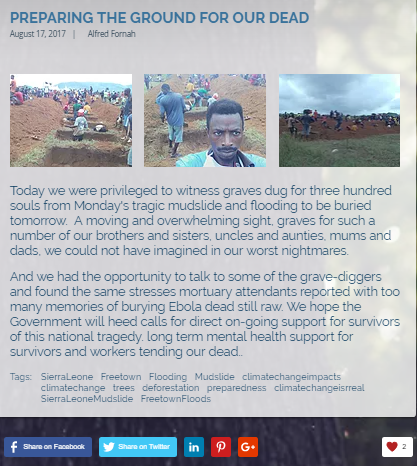SIERRA LEONE MUDSLIDE: OUR NATIONAL TRAGEDY A YEAR ON
- Alfred Fornah
- Aug 14, 2018
- 2 min read

A year to the day of the worst disaster in our nation’s history - the twin disaster (devastating mudslides and floods) that claimed upwards of 1000 lives - we join our countrymen and women to remember the too many dead and to join calls for action to make good on promises to survivors, too many still displaced.
On that dreadful day we reached more than 448,000 people direct and tens of millions more, as photographs and videos from volunteers in our climate change communication network were beamed with every news bulletin across the world helping keep the world's attention focused on Sierra Leone and the need for international assistance in the aftermath.
As the days unfolded and the body count continued to rise it was clear some lessons were learnt from the Ebola crisis, helping our preparedness and resilience - the command and control centres, once established, worked well and early Ministry of Health training on cholera identification and prevention averted a widespread outbreak. And UNEP and the environmental protection agency's technical study will help long-term to stabilize the structural integrity of Sugar Loaf mountain.
But the promise of those early weeks dissipated, life deteriorated for many survivors housed in camps and accountability all but disappeared. With more than 6,000 displaced and many still homeless the promise of permanent homes and direct aid payments went unfulfilled and eviction from temporary camps threatened. Question marks hang over the tens of millions of international aid with some claiming that much directly bolstered pre-election coffers. But with the election of a new government (the new direction) there are encouraging signs that survivors of our national tragedy may get justice after all with the announcement last month of a Le7.2 billion ($896,000) fund to provide Relocation Packages to 86 households in disaster prone 'Red Belt' areas at the foot of Sugar Loaf.
So, a year on from that tragic day which will forever remain etched on our national consciousness, we join calls for the government to honour commitments to survivors - too many still displaced - mental health support and a new home for every family.
For Regent - already in a protected area but one which remains under threat - we repeat calls made on World Environment Day to reforest Regent and make this place a Memorial Park in fitting remembrance of the many souls that rest in peace there still.














































Comments